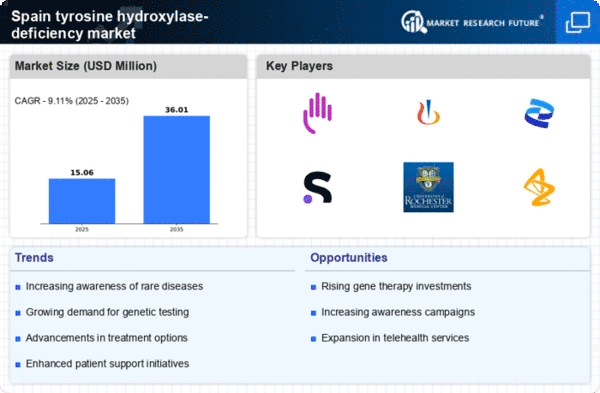Enhanced Research Funding
In Spain, the allocation of research funding for rare diseases, including tyrosine hydroxylase deficiency, is gaining momentum. Government initiatives and private sector contributions are increasingly directed towards understanding the underlying mechanisms of these disorders. Reports indicate that funding for rare disease research has seen a growth of approximately 15% annually over the past few years. This financial support is crucial for advancing the development of novel therapies and diagnostic tools. As researchers uncover new insights into tyrosine hydroxylase deficiency, the potential for innovative treatment options increases, thereby expanding the market. The collaboration between academic institutions and pharmaceutical companies is likely to foster a conducive environment for breakthroughs in the tyrosine hydroxylase-deficiency market, ultimately benefiting patients and healthcare providers alike.
Growing Patient Advocacy Groups
The emergence of patient advocacy groups in Spain plays a pivotal role in driving the tyrosine hydroxylase-deficiency market. These organizations are instrumental in raising awareness about the condition, providing support to affected families, and advocating for better healthcare policies. Their efforts have led to increased visibility of tyrosine hydroxylase deficiency, which may result in earlier diagnosis and treatment. Furthermore, these groups often collaborate with healthcare professionals and researchers to promote clinical trials and research initiatives. The influence of patient advocacy groups is expected to grow, potentially leading to a more informed public and increased demand for therapies. As these organizations continue to mobilize resources and support, they are likely to have a lasting impact on the tyrosine hydroxylase-deficiency market.
Technological Advancements in Diagnostics
Technological innovations in diagnostic tools are significantly impacting the tyrosine hydroxylase-deficiency market in Spain. The development of advanced genetic testing methods, such as next-generation sequencing, has improved the accuracy and speed of diagnosing this rare condition. These advancements enable healthcare providers to identify tyrosine hydroxylase deficiency more efficiently, which is crucial for timely intervention. The market for diagnostic tools is projected to grow by approximately 20% over the next five years, driven by the increasing demand for precise and rapid testing solutions. As diagnostic capabilities improve, the likelihood of early detection rises, which may lead to better patient outcomes and a subsequent increase in the demand for therapeutic options within the tyrosine hydroxylase-deficiency market.
Regulatory Support for Rare Disease Treatments
Regulatory frameworks in Spain are becoming increasingly supportive of the development of treatments for rare diseases, including tyrosine hydroxylase deficiency. Recent policy changes have streamlined the approval process for orphan drugs, encouraging pharmaceutical companies to invest in research and development. This regulatory environment is expected to enhance the availability of innovative therapies, potentially increasing market growth. The European Medicines Agency has also introduced incentives for companies developing treatments for rare conditions, which may further stimulate interest in the tyrosine hydroxylase-deficiency market. As regulatory bodies continue to prioritize rare diseases, the landscape for treatment options is likely to evolve, benefiting patients and healthcare providers.
Increasing Prevalence of Neurological Disorders
The rising incidence of neurological disorders in Spain is a crucial driver for the tyrosine hydroxylase-deficiency market. Recent studies indicate that the prevalence of such disorders is increasing, with estimates suggesting that approximately 1 in 10,000 individuals may be affected by tyrosine hydroxylase deficiency. This growing patient population necessitates enhanced diagnostic and therapeutic options, thereby stimulating market growth. As healthcare providers become more aware of the condition, the demand for specialized treatments is likely to rise. Furthermore, the increasing burden of neurological diseases on the healthcare system in Spain may prompt government and private sector investments in research and development, ultimately benefiting the tyrosine hydroxylase-deficiency market. The focus on improving patient outcomes and quality of life is expected to drive innovation in treatment modalities.
















